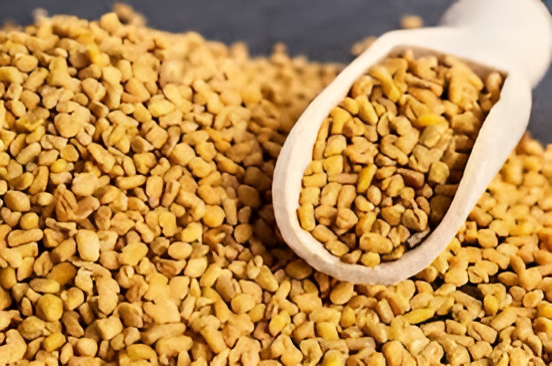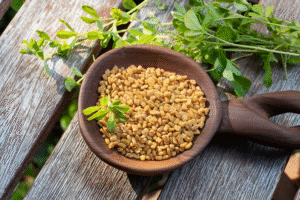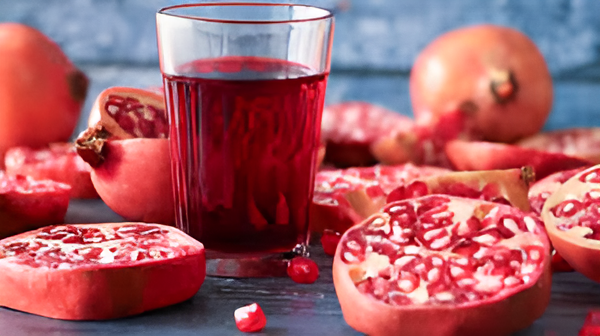
Methi, another name for fenugreek, is a potent medicinal herb that is frequently used in Ayurvedic medicine and Indian cookery. Fenugreek’s seeds and leaves provide a number of health advantages, ranging from better digestion and hair growth to blood sugar regulation.its Fenugreek benifits

Top Health Benefits of Fenugreek
-
Controls Blood Sugar
Rich in soluble fiber, fenugreek seeds assist diabetics control their blood sugar levels and slow down digestion. -
Improves Digestion
Because of its high fiber content and anti-inflammatory qualities, fenugreek is a great remedy for bloating, constipation, and indigestion. -
Boosts Breast Milk Production
For many years, nursing moms have used fenugreek as a natural galactagogue, or milk enhancer. -
Reduces Cholesterol
Frequent ingestion may promote heart health and reduce bad cholesterol (LDL). -
Supports Weight Loss
Its fiber reduces hunger and helps you regulate your weight by keeping you fuller for longer. -
Improves Hair Health
Fenugreek strengthens hair follicles, encourages hair growth, and lessens dandruff. DIY hair masks frequently utilize it. -
Balances Hormones in Women
Because it promotes hormonal balance, fenugreek may help reduce menopausal and PMS symptoms. -
Enhances Skin Health
Its anti-inflammatory and antioxidant properties aid in acne treatment and skin maintenance.
Nutritional Value of Fenugreek Seeds (per 100 grams)
- Calories: 323 kcal
- Protein: 23 g
- Fiber: 25 g
- Carbohydrates: 58 g
- Iron: 33.5 mg
- Magnesium: 191 mg
- Calcium: 176 mg
- Phosphorus: 296 mg
- Vitamin B6: 0.6 mg
Traditional Uses of Fenugreek
- Ayurveda: Used to treat inflammation, indigestion, and diabetes.
- Unani medicine is well-known for its ability to treat metabolic and respiratory disorders.
- Folk remedies: Used to improve skin texture, relieve joint discomfort, and soothe sore throats.
Modern Uses & Supplements
Nowadays, fenugreek comes in a variety of forms, such as:
- Capsules and tablets – for blood sugar and cholesterol management
- Fenugreek tea – a detox and digestive aid
- Powdered form – added to protein shakes or smoothies
- Essential oils – for skin and hair application
Before taking fenugreek supplements, especially when pregnant, always get medical advice.
How to Use Fenugreek :
-
Soaked Seeds: One teaspoon of fenugreek seeds should be soaked in water for the entire night. On an empty stomach, chew the seeds and drink the water first thing in the morning.
-
Fenugreek Tea: Boil 1 teaspoon of fenugreek seeds in water for 5 to 7 minutes, drain, and then sip.
-
Fenugreek Powder: Fenugreek powder can be added to curries or chapati dough, or it can be combined with honey and consumed.
-
Fenugreek Leaves (Fresh/Dry): Use fresh or dried fenugreek leaves in parathas, dals, and curries.
-
Hair Mask: Apply the hair mask to the scalp after soaking the seeds, grinding them into a paste, and combining them with coconut oil or yogurt.
Common Uses of Fenugreek benifits
- Culinary: Pickles, curries, dals, and spice blends all use fenugreek leaves and seeds.
- Medicinal: Used to treat illnesses as soaking seeds, powders, teas, or capsules.
- Cosmetic: Fenugreek pastes are used to treat the skin and scalp.
- Home Remedies: Frequently used to cure colds, sore throats, or digestive problems in combination with honey, lemon, or turmeric.
Precautions & Side Effects
Despite being usually harmless, some people may experience negative effects from fenugreek, particularly if they ingest high amounts of it.
- Possible adverse effects include dizziness, bloating, flatulence, and a maple-like body odor.
- Overconsumption during pregnancy may cause uterine contractions.
- Allergy: uncommon, however sensitive people may react to it.
- Interaction: May conflict with blood thinners or diabetes drugs.
Note: Always add it gradually to your diet and keep an eye on how your body responds.
Precautions :
- Overconsumption may result in gas or bloating.
- If you’re on diabetes medication, it can drop blood sugar too much; speak with your doctor.
- Large doses of supplements, particularly fenugreek, should be avoided by expectant mothers.
💡 Quick Tips :
- For a morning detox, combine fenugreek powder with honey or warm water.
- To enhance the flavor and scent of your cuisine, use dried leaves (kasuri methi).
- Soak the seed paste and apply it to your face as a natural skin toner and exfoliator.
❓ FAQs :
Q: Is it possible to take fenugreek daily?
Yes, modest daily doses are both safe and advantageous.
Q: What is the recommended dosage of fenugreek?
For general health, 1-2 tablespoons of seeds or powder per day is adequate.
Q: Does fenugreek aid with hair loss?
Yes, when taken consistently, it fortifies hair roots and stops hair loss.
Q : Is it beneficial for guys as well?
Of course. Additionally, it might aid in increasing testosterone levels and enhancing endurance.
✅ Conclusion :
Fenugreek benifits ,A straightforward but effective substance with many health advantages is fenugreek. Including fenugreek in your daily routine can have a significant impact on your goals of improved digestion, weight loss, hormonal balance, or radiant skin. Fenugreek has natural and reasonably priced benefits.
From helping with digestion and diabetes management to enhancing the condition of skin and hair, fenugreek is a multipurpose herb that has many health advantages. You can take advantage of its potent healing qualities by incorporating it into your regular meals or by using it in natural therapies.
Eating Habbits article : Eating tips
For more Information : Home Health tips , Entertainment, food Technology







